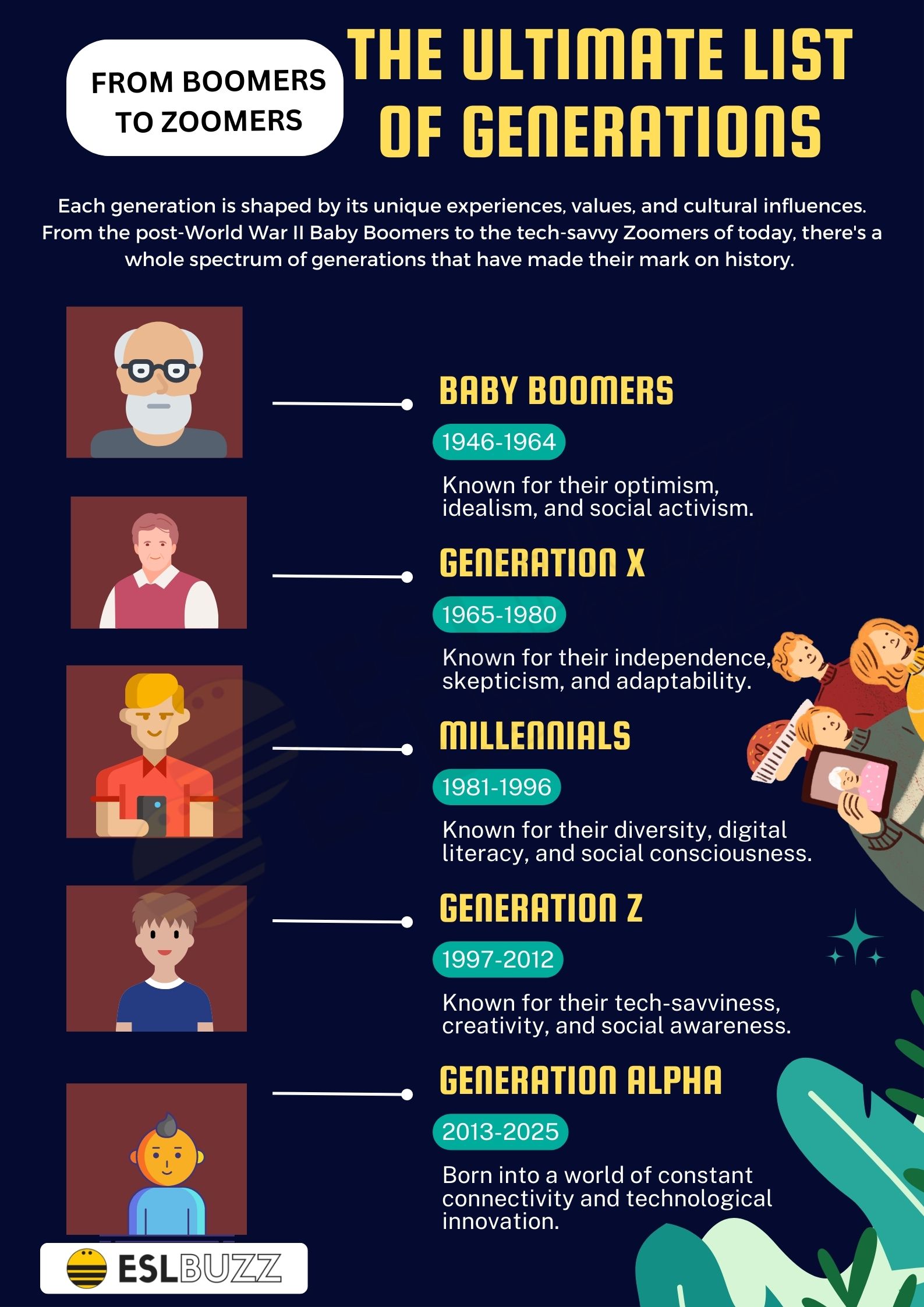The concept of generations is a fascinating lens through which we can examine societal changes, cultural shifts, and the evolution of human behavior. Each generation carries its unique characteristics, shaped by historical events, technological advancements, and social movements. Understanding the list of generations not only helps us appreciate the past but also enables us to navigate the present and anticipate the future. As we delve deeper into the list of generations, we will explore how they influence our identities and the world around us.
Generations are often defined by specific birth years, cultural milestones, and shared experiences. From the Silent Generation, who grew up during the Great Depression, to Generation Z, who are digital natives, each group has left an indelible mark on society. This article will provide a comprehensive overview of the list of generations, highlighting their defining traits and contributions to the world.
As we embark on this exploration, it's essential to recognize that while generational labels can provide insight, they are not definitive. Individuals within a generation can vary widely in their beliefs and behaviors. Nonetheless, the list of generations serves as a valuable framework for understanding the collective experiences that shape us all.
What Are the Major Generations in History?
Throughout history, several generations have emerged, each with its unique identity. Here is a brief overview of the prominent generations:
- Lost Generation (1883-1900): Known for their disillusionment following World War I.
- Greatest Generation (1901-1927): Resilient individuals who fought in World War II.
- Silent Generation (1928-1945): Grew up during the Great Depression and World War II.
- Baby Boomers (1946-1964): Associated with post-war prosperity and social change.
- Generation X (1965-1980): Often characterized by their skepticism and independence.
- Millennials (1981-1996): Known for their tech-savviness and focus on diversity.
- Generation Z (1997-2012): Digital natives who are redefining communication and social norms.
- Generation Alpha (2013-Present): The youngest generation, still in their formative years.
How Are Generations Defined?
The definition of generations typically hinges on a combination of birth years and significant historical events. Sociologists and demographers often use these elements to categorize individuals into groups based on the experiences that have shaped their formative years. For instance, Baby Boomers are often defined by the post-war economic boom, while Millennials are influenced by the rise of the internet and globalization.
What Influences the Characteristics of Each Generation?
Several factors contribute to the defining characteristics of each generation. These include:
- Historical Events: Major events such as wars, economic crises, and political movements can shape the values and perspectives of a generation.
- Technological Advances: The advent of technology, from the radio to the internet, significantly influences how generations communicate and interact.
- Cultural Shifts: Changes in societal norms, such as attitudes toward race, gender, and family structures, impact generational identity.
- Economic Conditions: The economic climate during formative years affects career choices, financial stability, and lifestyle preferences.
Why Is Understanding the List of Generations Important?
Understanding the list of generations is crucial for several reasons:
- Interpersonal Relationships: Knowledge of generational differences can improve communication and relationships across age groups.
- Workplace Dynamics: In professional settings, recognizing generational traits can enhance teamwork and productivity.
- Marketing Strategies: Businesses can tailor their marketing efforts by understanding the preferences and behaviors of different generations.
- Policy Making: Policymakers can consider generational needs when creating programs and initiatives that affect society.
What Are the Key Characteristics of Each Generation?
Here’s a closer look at the defining traits of each generation:
- Lost Generation: Disillusioned, critical of traditional values.
- Greatest Generation: Resilient, community-focused, and hard-working.
- Silent Generation: Cautious, disciplined, and value loyalty.
- Baby Boomers: Optimistic, competitive, and resource-driven.
- Generation X: Independent, skeptical, and adaptable.
- Millennials: Diverse, tech-savvy, and socially conscious.
- Generation Z: Pragmatic, entrepreneurial, and digitally fluent.
- Generation Alpha: Innovative, collaborative, and globally aware.
How Do Generational Differences Impact Society?
Generational differences play a significant role in shaping societal trends and behaviors. For example, Baby Boomers may value job stability and traditional career paths, while Millennials and Generation Z prioritize work-life balance and flexibility. These differing values lead to distinct approaches to education, employment, and social engagement.
What Are Some Common Misconceptions About Generations?
There are several misconceptions surrounding generational labels that are worth addressing:
- Overgeneralization: Not all individuals within a generation fit the stereotypes; personal experiences vary widely.
- Static Definitions: Generational characteristics can evolve over time as new experiences shape individuals.
- Negative Bias: Each generation has its strengths and weaknesses; it’s essential to appreciate the contributions of all groups.
Conclusion: The Future of Generations
As we move further into the 21st century, the list of generations will continue to evolve. Generation Alpha is just beginning to emerge, and their experiences will undoubtedly shape the future in ways we cannot yet imagine. By understanding the list of generations and their unique characteristics, we can foster greater empathy and collaboration across age groups.
Ultimately, the study of generations serves as a reminder of the rich tapestry of human experience. Each generation contributes to the narrative of our society, and by appreciating these differences, we can work together to create a better future for all.
:max_bytes(150000):strip_icc()/names-of-generations-1435472_v31-5b48e0cec9e77c0037f56645.png)


